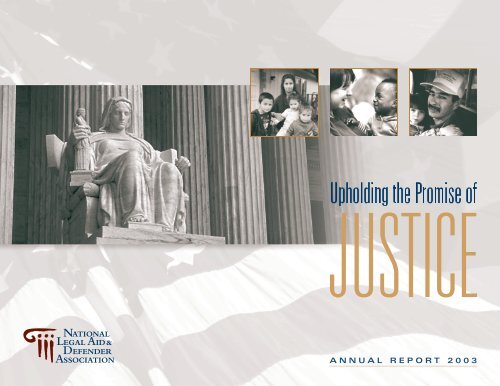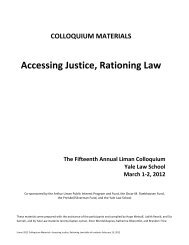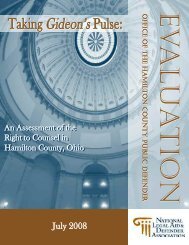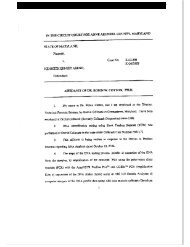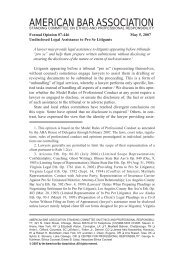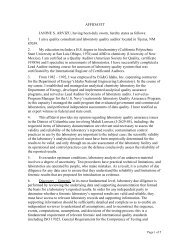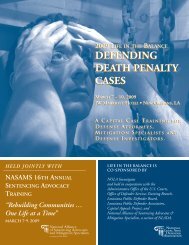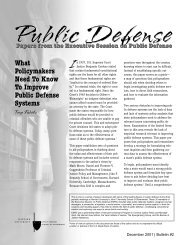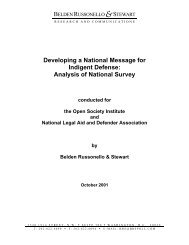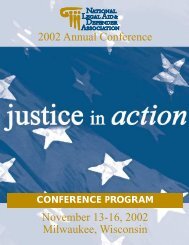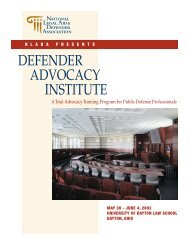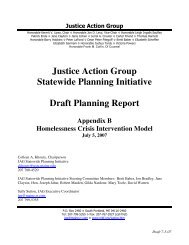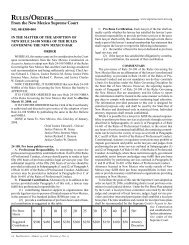2003 NLADA Annual Report - National Legal Aid & Defender ...
2003 NLADA Annual Report - National Legal Aid & Defender ...
2003 NLADA Annual Report - National Legal Aid & Defender ...
Create successful ePaper yourself
Turn your PDF publications into a flip-book with our unique Google optimized e-Paper software.
Upholding the Promise of<br />
JUSTICE<br />
ANNUAL REPORT <strong>2003</strong>
“Each era finds an improvement in law<br />
for the benefit of mankind.”<br />
—Anonymous<br />
Epitaph of Clarence Earl Gideon
MESSAGE FROM THE PRESIDENT<br />
On behalf of the <strong>National</strong> <strong>Legal</strong> <strong>Aid</strong> & <strong>Defender</strong> Association’s<br />
(<strong>NLADA</strong>) Board of Directors and staff, it is my pleasure to<br />
report on the Association’s <strong>2003</strong> accomplishments in the pursuit<br />
of “Upholding the Promise of Justice.”<br />
In <strong>2003</strong>, <strong>NLADA</strong> marked the 40th anniversary of Gideon v.<br />
Wainwright — the landmark U.S. Supreme Court case that guarantees<br />
the right to counsel in cases that might result in imprisonment,<br />
with the launch of “No Exceptions,” a national public<br />
awareness campaign. As I reflect upon this monumental decision,<br />
I am in awe of the impact one person made on the criminal<br />
justice system with a single hand-written petition appealing<br />
his conviction to the highest court of the land.<br />
Clarence Earl Gideon was a poor man from Florida who was<br />
sentenced to five years in prison for a petty pool hall burglary<br />
he did not commit. In 1963, states were not required to provide<br />
lawyers in criminal cases and thus, Gideon had no counsel at<br />
his trial. In fact, thousands of people were forced to go to trial<br />
without representation, thereby suffering the consequences of<br />
a lack of education in the complex nuances of the law.<br />
Gideon sought to rectify his wrongful conviction by first<br />
studying the supreme law of the land and then petitioning the<br />
U.S. Supreme Court. As a result of his perseverance, Americans<br />
now have the constitutional right to counsel in cases where the<br />
outcome could be incarceration. However, as <strong>NLADA</strong> observed<br />
the 40th anniversary of Gideon v. Wainwright in <strong>2003</strong>, we knew<br />
first-hand there remains much work to ensure that the right to<br />
counsel is fully realized in every state across the nation.<br />
Although public defenders are assigned cases when the<br />
accused cannot afford counsel, the caseloads for these attorneys<br />
are often too vast to provide proper representation. It is not<br />
uncommon for a person to sit in jail for weeks or months before<br />
being assigned counsel, or for a person’s first meeting with<br />
assigned counsel to occur the day of a court appearance. This is<br />
not justice. Our public defense system in the United States is in<br />
a state of crisis.<br />
To address the crisis we face in our public defense system,<br />
<strong>NLADA</strong> launched the “No Exceptions” campaign to raise public<br />
awareness. The results of the campaign were compelling enough<br />
to warrant the formation of a bipartisan <strong>National</strong> Committee<br />
on the Right to Counsel, charged with research and evaluation<br />
duties to help pave the way for much needed reform.<br />
Although Gideon v. Wainwright is a criminal law case, our civil<br />
work embraces the spirit of Gideon’s acknowledgement of the<br />
importance of access to counsel for all people. Along with our<br />
efforts to reform the public defense system in the United States,<br />
we have also worked hard to preserve and protect funding for<br />
civil legal aid, ensuring that federal support of the <strong>Legal</strong> Services<br />
Corporation remains strong. We have advocated zealously<br />
for the creation of loan repayment assistance programs for<br />
civil legal aid attorneys at the state, federal, law school and<br />
employer levels.<br />
Though much remains to be accomplished in the years<br />
ahead, it is <strong>NLADA</strong>’s goal that when the 50th anniversary of<br />
Gideon is celebrated, Gideon’s promise will be realized not just<br />
symbolically but substantively. “Upholding the Promise of<br />
Justice” are more than words to <strong>NLADA</strong> — it’s a cause we<br />
believe in and one that our front-line attorneys work every<br />
day to achieve. As it is so appropriately stated in Gideon’s<br />
gravestone epitaph, “Each era finds an improvement in law<br />
for the benefit of mankind.” I challenge everyone reading this<br />
report to make real the promise of justice for all.<br />
The following pages highlight <strong>NLADA</strong>’s <strong>2003</strong> accomplishments,<br />
and illustrate the ways <strong>NLADA</strong> has worked to support<br />
the cause of equal justice. Without the support of our partners<br />
— <strong>NLADA</strong> members and donors — what was accomplished in<br />
<strong>2003</strong> would not have been possible.<br />
As always, thank you for your continued support and<br />
commitment in helping <strong>NLADA</strong> achieve justice for all in<br />
America.<br />
Sincerely,<br />
Clinton Lyons<br />
President & CEO<br />
Upholding the Promise of Justice<br />
3
ANNUAL REPORT <strong>2003</strong><br />
CIVIL LEGAL SERVICES<br />
<strong>NLADA</strong>’s civil legal aid members are critical advocates in the<br />
lives of men and women facing domestic violence, children who<br />
are abused, individuals who are unfairly evicted from their<br />
homes and others who are homeless. Increasingly, these issues,<br />
as well as health care, access to education, and life-threatening<br />
working and living conditions for farm workers are addressed<br />
by civil legal aid attorneys who are often challenged by inadequate<br />
resources to provide fair and equal access to justice for<br />
their clients.<br />
Despite the many attempts to reduce and even eliminate<br />
services and funding, <strong>NLADA</strong> works tirelessly on behalf of the<br />
front-line attorneys whose daily efforts to secure justice for those<br />
marginalized in society often go unrecognized. While <strong>NLADA</strong><br />
works hard to secure such resources, the need still far outweighs<br />
the capacity, leaving our members without support and their<br />
clients with less than a fair shot at equal justice. Despite this,<br />
<strong>NLADA</strong> experienced a number of successes in <strong>2003</strong> that contributed<br />
to improvements in the lives of thousands of people<br />
in the United States.<br />
Following are some of the highlights:<br />
WORKING TO PRESERVE,EXPAND AND PROTECT FUNDING FOR LEGAL AID<br />
<strong>NLADA</strong> was integral to ensuring federal support of the <strong>Legal</strong><br />
Services Corporation (LSC) funding for fiscal year 2004. As a<br />
result of <strong>NLADA</strong>’s advocacy efforts, principally by its nationwide<br />
grass roots network, $335.3 million was appropriated to<br />
support legal aid programs that receive LSC grants. In addition,<br />
<strong>NLADA</strong>, along with its counsel from the Center for Law and<br />
Social Policy (CLASP), was actively engaged in advocacy before<br />
LSC around a wide array of regulatory issues, including financial<br />
eligibility, group representation and access for limited<br />
English proficient communities. <strong>NLADA</strong> staff also were integrally<br />
involved with the selection of a new LSC Board of<br />
Directors and president during <strong>2003</strong>.<br />
On March 26, <strong>2003</strong>, the U.S. Supreme Court upheld the<br />
constitutionality of Interest on Lawyers’ Trust Accounts (IOLTA)<br />
funding in the victorious case of Brown v. <strong>Legal</strong> Foundation of<br />
Washington. This decision protected a vital funding source for<br />
civil legal aid in this country. <strong>NLADA</strong> participated for a number<br />
of years in the comprehensive national legal defense of the<br />
program, culminating with its filing of an amicus curiae brief<br />
in support of the IOLTA programs. The decision protected<br />
approximately $160 million in financial support for legal aid.<br />
<strong>NLADA</strong> also actively lobbied Congress and the Department of<br />
Justice in support of the $40 million <strong>Legal</strong> Assistance to Victims<br />
(LAV) program administered by the Office on Violence Against<br />
Women. This funding provides legal aid programs across the<br />
nation with additional resources to address the growing problems<br />
associated with family violence and domestic abuse.<br />
Additionally, <strong>NLADA</strong> staff provide a wide range of technical<br />
assistance to recipients of LAV funding.<br />
In an effort to assist legal aid attorneys in pursuing careers in<br />
public interest law, <strong>NLADA</strong> has vigorously advocated for the<br />
creation of loan repayment assistance programs for civil legal aid<br />
attorneys at the state, federal, law school and employer levels.<br />
Bills have been drafted and discussed in Congress regarding<br />
both relief under the Stafford Loan program and the creation<br />
of a federal loan forgiveness program similar to those existing<br />
already for a number of federal agencies. <strong>NLADA</strong> is also actively<br />
involved in advising LSC in the development of a pilot $1 million<br />
loan forgiveness proposal.<br />
TECHNICAL ASSISTANCE AND SUPPORT<br />
<strong>NLADA</strong> staff provide technical assistance on a regular basis<br />
to members on important civil legal aid issues. Staff were extensively<br />
involved during the year in advising programs in critical<br />
negotiations related to the LSC state planning process, the evaluation<br />
of newly emerging state justice communities, the implementation<br />
of funding changes resulting from the 2000 decennial<br />
census, the challenges of program-owned evaluation and quality<br />
in service and a host of other issues related to the delivery of<br />
effective, efficient legal services.<br />
4 <strong>National</strong> <strong>Legal</strong> <strong>Aid</strong> & <strong>Defender</strong> Association
In addition, under <strong>NLADA</strong>’s contract with CLASP, hundreds<br />
of members were provided important legal advice and technical<br />
assistance on matters concerning LSC and other issues related<br />
to civil legal assistance.<br />
NURTURING COLLABORATION AMONG STAKEHOLDERS<br />
The SPAN Access to Justice Support Project convened the<br />
second national meeting of State Access to Justice Chairs, which<br />
brought together over 70 leaders from 33 states and the District<br />
of Columbia to share their successes and learn from one another’s<br />
experiences. At the meeting, SPAN released an updated<br />
edition of its 50-state report containing the latest information<br />
on partnerships among the bar, the courts, legal services<br />
providers and other stakeholders to improve and expand civil<br />
legal assistance in every state in<br />
the country. A joint project of<br />
<strong>NLADA</strong> and the ABA’s Standing<br />
Committee on <strong>Legal</strong> <strong>Aid</strong> and<br />
Indigent Defendants, SPAN<br />
provides support and coordination<br />
for state-level partnerships<br />
dedicated to improving civil<br />
legal assistance and expanding<br />
access to justice for low-income<br />
people. Among the initiatives these partnerships have undertaken<br />
are obtaining or increasing state funding for civil legal<br />
assistance, expanding pro bono efforts by volunteer private<br />
attorneys, making the courts more user-friendly and responsive<br />
to self-represented litigants, and increasing coordination among<br />
providers to ensure that the full range of legal needs of lowincome<br />
people in the state is addressed.<br />
THE PROJECT FOR THE FUTURE OF EQUAL JUSTICE<br />
In its seventh year, the Project for the Future of Equal Justice<br />
(the Project), a joint initiative of <strong>NLADA</strong> and CLASP funded<br />
by the Open Society Institute, continued its leadership role by<br />
developing and promoting new partnerships, new messages<br />
and new models for ensuring that low-income people have<br />
meaningful access to equal justice.<br />
In <strong>2003</strong>, the Project emphasized work focused on improving<br />
the content of “equal justice” available to low-income people<br />
and people of color. Here are some highlights of the Project’s<br />
work in <strong>2003</strong>:<br />
■ The Project played a critical role in developing <strong>NLADA</strong>’s Civil<br />
Justice Leadership Initiative. The Project worked closely with<br />
<strong>NLADA</strong>’s civil and defender staff and volunteers to develop<br />
the Leadership Competencies and Practices for <strong>Defender</strong>s, laying<br />
the groundwork for the Leadership Competencies and Practices<br />
for Civil Justice Leaders. The Project also partnered with the<br />
Management Information Exchange and the New England<br />
<strong>Legal</strong> Services Training Consortium to support statewide and<br />
regional leadership development trainings.<br />
■ Throughout the year, the Project has supported and promoted<br />
community problem-solving approaches within civil legal<br />
aid, civil rights and community-based organizations.<br />
The Project presented at the NAACP <strong>Legal</strong> Defense and<br />
Educational Fund’s <strong>Annual</strong> Civil Rights Training Institute<br />
and trained numerous groups of community problem solvers<br />
in the civil justice field. The Project has also been a key player<br />
in the development of the Consortium on Community<br />
Problem Solving, which is comprised of courts, prosecutors,<br />
defenders, civil justice, legal academics and others committed<br />
to applying problem-solving approaches.<br />
■ The Project has injected and introduced civil rights and racial<br />
justice advocates, scholars, and perspectives into the collaborations,<br />
planning processes, and partnerships of <strong>NLADA</strong> and<br />
CLASP. Many of the civil rights sessions and themes of national<br />
and regional legal aid conferences and trainings have been<br />
initiated or coordinated through the Project.<br />
■ The Project has continued its ground-breaking communications<br />
work around public awareness and resource development.<br />
In December <strong>2003</strong>, the Project gathered civil legal aid<br />
lawyers, civil rights lawyers, policy advocates, and community<br />
organizers for an intensive skills training — “Media Advocacy<br />
for Equal Justice: A Training for the Deep South Region.”<br />
This two-day training developed capacity and fostered relationships<br />
for justice within and across four Southern states —<br />
Alabama, Arkansas, Louisiana and Mississippi.<br />
Upholding the Promise of Justice<br />
5
ANNUAL REPORT <strong>2003</strong><br />
DEFENDER LEGAL SERVICES<br />
Fixing the universal right to counsel in the national conscience,<br />
Justice Hugo Black once wrote: “The right of one<br />
charged with a crime to counsel may not be deemed fundamental<br />
and essential to fair trials in some countries, but it is<br />
in ours.” Public defenders are the guarantors of this right for<br />
the indigent accused; they ensure that the right to counsel<br />
exists for every individual, regardless of his or her ability to pay.<br />
Accordingly, <strong>NLADA</strong>’s <strong>Defender</strong> <strong>Legal</strong> Services is privileged to<br />
work towards improving the capacities of public defenders<br />
nationwide. <strong>Defender</strong> <strong>Legal</strong> Services is the leading provider<br />
of standards, training, networking, information and technical<br />
assistance for America’s dedicated indigent defense attorneys.<br />
Following are some of the highlights:<br />
LEGISLATIVE INITIATIVES<br />
Loan Forgiveness: <strong>NLADA</strong> continued to advocate for a federal<br />
loan forgiveness bill that would grant qualifying defenders and<br />
prosecutors with partial forgiveness of Stafford loans.<br />
Sentencing Reform: After an ideologically driven amendment<br />
to federal sentencing guidelines restricting federal judges’ discretion<br />
to depart below federal sentencing guideline ranges passed,<br />
Democrats introduced legislation to repeal all provisions but<br />
those relating directly to child or sex offenses. <strong>NLADA</strong> drafted<br />
a letter of support for the repeal, which was entered into the<br />
Congressional Record by Senator Ted Kennedy (D-MA).<br />
Legislative Network: <strong>NLADA</strong> supports legislative reform efforts<br />
at the state level through networking and information sharing<br />
at conferences and the American Council of Chief <strong>Defender</strong>s’<br />
meetings.<br />
TECHNICAL ASSISTANCE,RESEARCH AND EVALUATIONS<br />
The technical assistance, research and evaluation initiative is<br />
one of the most self-empowering tools <strong>NLADA</strong> provides defenders.<br />
<strong>NLADA</strong> assists whole states and counties by conducting<br />
comprehensive evaluations of entire indigent defense systems.<br />
In <strong>2003</strong>, <strong>NLADA</strong> completed a study for Clark County,<br />
Nevada, that concluded the public defender office could not<br />
institute a performance-based accountability system or provide<br />
effective and efficient representation without a serious recommitment<br />
of resources to that defender office. As a result, the<br />
county increased staffing and funding to support the implementation<br />
of the study’s recommendations.<br />
In Maryland, <strong>NLADA</strong>’s consulting regarding a statewide caseload<br />
crisis resulted in a budget increase of 8.4 percent to hire<br />
58 new staff members, 30 of whom will be attorneys.<br />
In Louisiana, <strong>NLADA</strong>, in cooperation with the <strong>National</strong><br />
Association of Criminal Defense Lawyers (NACDL) and the<br />
American Bar Association (ABA), worked with legislators and<br />
potential coalition members to create a Louisiana Task Force<br />
on Indigent Defense.<br />
In Texas, <strong>NLADA</strong> continued to work with the Indigent<br />
Defense Commission Subcommittee on indigent financial<br />
eligibility standards.<br />
North Carolina’s Mecklenberg County Public <strong>Defender</strong> hired<br />
<strong>NLADA</strong> to conduct an on-site round table discussion regarding<br />
date reporting and time-tracking. As a result, <strong>NLADA</strong> is currently<br />
working to improve communication and negotiating a contract<br />
to work with public defenders to create sound performance<br />
measures and evaluation processes.<br />
After filing a class action suit against the state of Montana,<br />
the ACLU hired <strong>NLADA</strong> to project the cost for a statewide system<br />
that meets the ABA Ten Principles of a Public Defense Delivery<br />
System. <strong>NLADA</strong> also provided technical assistance to Oregon as<br />
the state dealt with an extreme budget deficit affecting the availability<br />
of counsel for accused persons charged with nonviolent<br />
misdemeanors and felonies.<br />
6 <strong>National</strong> <strong>Legal</strong> <strong>Aid</strong> & <strong>Defender</strong> Association
THE NATIONAL DEFENDER LEADERSHIP INSTITUTE<br />
The <strong>NLADA</strong> <strong>National</strong> <strong>Defender</strong> Leadership Institute (NDLI) is<br />
in its third year and has developed its most advanced leadership<br />
education programs to date.<br />
NDLI’s seminars,<br />
Nuts & Bolts of<br />
Leadership and<br />
Management, New<br />
Leadership, and<br />
Impact Leadership,<br />
are designed<br />
for experienced<br />
defender administrators<br />
from any<br />
type of public<br />
defense program. The Impact Leadership seminar series began<br />
with a September retreat in Scottsdale, Arizona, reconvened in<br />
November in Seattle and ended with a final three-day seminar<br />
in Chicago. Both seminars, Nuts & Bolts and Impact Leadership,<br />
are unique because they invite administrators and defenders to<br />
bring written copies of office-specific challenges and leadership<br />
initiatives to be discussed among the participants so they return<br />
home with practical action plans.<br />
NDLI was pleased to partner with the Brennan Center for<br />
Justice at New York University School of Law to promote<br />
community-oriented defense in the indigent defense community.<br />
Among other activities, Brennan Center staff attended Nuts &<br />
Bolts and provided on-site support for defenders engaged (or<br />
planning to engage) in community-oriented lawyering.<br />
THE DEFENDING IMMIGRANTS PARTNERSHIP<br />
The Defending Immigrants Partnership (DIP) is a collaborative<br />
effort of the Immigrant <strong>Legal</strong> Resource Center, the New York<br />
State <strong>Defender</strong> Association, the <strong>National</strong> Immigration Project of<br />
the <strong>National</strong> Lawyers Guild and <strong>NLADA</strong> (headquarters for DIP),<br />
to provide defenders with the knowledge and capacity to competently<br />
represent their immigrant clients. Fully grant funded by<br />
the Open Society Institute and the Ford Foundation, DIP<br />
answers the questions of trial attorneys, conducts national and<br />
regional in-depth trainings for defenders and creates both print<br />
and Web resources about immigration consequences for defense<br />
attorneys, the first line of defense for some of our community’s<br />
most vulnerable members.<br />
The principal focus of DIP in <strong>2003</strong> was to assist state criminal<br />
defense attorneys in the six states with the highest immigrant<br />
populations, namely, California, New York, Florida, Illinois,<br />
Texas and New Jersey. In California and New York, where<br />
immigration-criminal defense programs addressing immigration<br />
consequences are ongoing, the goal is to enhance and expand<br />
“in-house immigration specialist” models that can be adopted<br />
by defender offices in other states and on the federal level. In<br />
Florida, Illinois, New Jersey and Texas, in which no joint programs<br />
exist, the emphasis is to provide assistance to all defense<br />
counsel representing indigent noncitizens, and to enable them<br />
to build programs and increase resources to address immigration<br />
consequences competently.<br />
Upholding the Promise of Justice<br />
7
ANNUAL REPORT <strong>2003</strong><br />
<strong>NLADA</strong> MEMBERSHIP<br />
Members of <strong>NLADA</strong> are organizations and individuals dedicated<br />
to expanding access to effective legal assistance for people<br />
who cannot afford counsel. <strong>NLADA</strong> serves as a collective voice<br />
for both civil and public defender community members and has<br />
two types of membership — program and individual.<br />
Program Members of <strong>NLADA</strong> include nonprofit organizations,<br />
government agencies, social service organizations, public<br />
interest groups, pro bono programs, bar associations, IOLTA<br />
programs, law school clinics, assigned counsel, corporate legal<br />
departments and law firms. There are four types of program<br />
members: civil, defender, associate and corporate associate. In<br />
<strong>2003</strong>, <strong>NLADA</strong> had 689 program members, representing more<br />
than 12,000 attorneys in the 50 states, and the District of<br />
Columbia, Puerto Rico, the U.S. Virgin Islands and Micronesia.<br />
Individual Members of <strong>NLADA</strong> include civil legal aid advocates<br />
and public defense professionals, bar association leaders<br />
and staff, private practice attorneys, judges, law school clinicians<br />
and clients, law students, fellows and private citizens who<br />
support <strong>NLADA</strong>’s mission. Over 300 individuals joined <strong>NLADA</strong><br />
in <strong>2003</strong>, bringing the total individual membership to 1,191.<br />
CORPORATE ASSOCIATE MEMBERS - 3%<br />
LSC-FUNDED CIVIL LEGAL AID PROGRAMS - 19%<br />
DEFENDER PROGRAM AND CHIEF MEMBERS - 19%<br />
ASSOCIATE PROGRAM MEMBERS - 19%<br />
8 <strong>National</strong> <strong>Legal</strong> <strong>Aid</strong> & <strong>Defender</strong> Association<br />
OTHER CIVIL LEGAL AID PROGRAMS - 39%
TRAINING & CONFERENCES<br />
Each year, thousands of civil legal aid and public defense<br />
professionals attend <strong>NLADA</strong>’s nationally acclaimed educational<br />
training programs and conferences. <strong>NLADA</strong>’s training agenda<br />
promotes excellence in the delivery of all aspects of legal services<br />
for attorneys representing low-income communities in the<br />
United States. Additionally, advocates are able to fulfill continuing<br />
legal education requirements as they network and exchange<br />
ideas with colleagues.<br />
The culmination of<br />
<strong>NLADA</strong>’s training agenda<br />
is the <strong>Annual</strong> Conference,<br />
the nation’s leading summit<br />
and training conference for<br />
the equal justice community.<br />
This conference provides a<br />
wide array of forums rich in<br />
opportunities to acquire new<br />
skills and information, try<br />
out new ideas, share “best<br />
practices” information and<br />
build upon professional<br />
relationships.<br />
Over 800 advocates gathered at the <strong>2003</strong> <strong>Annual</strong> Conference<br />
to commemorate the 40th anniversary of Gideon v. Wainwright,<br />
the landmark U.S. Supreme Court decision guaranteeing the<br />
right to counsel for persons facing imprisonment. Both the civil<br />
legal aid and defender communities used the marking of the<br />
anniversary to assess where each community stood in its equal<br />
justice mission, and outline steps to be taken in support of<br />
the promise of access to justice in the future. Highlights of the<br />
<strong>Annual</strong> Conference included: a luncheon panel discussing leadership<br />
and diversity following the U.S. Supreme Court ruling<br />
in Grutter v. Bollinger; a rousing keynote address by Chief Justice<br />
Gerry L. Alexander, Washington State Supreme Court; and the<br />
joint civil/defender mental health training track.<br />
<strong>2003</strong> marked an important milestone in <strong>NLADA</strong>’s long history<br />
of training equal justice advocates. As a preconference event<br />
to the Substantive Law Conference, <strong>NLADA</strong> presented a Trial<br />
Advocacy Training Program for <strong>Legal</strong> <strong>Aid</strong> Attorneys,<br />
designed specifically for the needs of the civil legal aid attorney.<br />
In <strong>2003</strong>, for civil legal aid advocates, <strong>NLADA</strong> offered:<br />
■ The Substantive Law Conference, the nation’s most comprehensive<br />
training on poverty law and trends for advocates<br />
covering an array of specialty areas;<br />
■ The Equal Justice Conference, presented in partnership<br />
with the American Bar Association, for advocates who work<br />
in various sectors of the equal justice community’s legal aid<br />
programs, pro bono projects and practitioners, court-annexed<br />
pro se clinics, law school clinicians, hotline providers and<br />
others; and,<br />
■ Media Advocacy for Equal Justice: A Training for the<br />
Deep South Region, presented in partnership with the<br />
Project for the Future of Equal Justice.<br />
In <strong>2003</strong>, for public defense professionals, <strong>NLADA</strong> offered:<br />
■ The Life in the Balance Conference, providing skills training<br />
on case strategies and the latest developments in science<br />
for public defenders, investigators and mitigation specialists<br />
in capital cases;<br />
■ The Impact Leadership Conference, for leaders and managers<br />
of defender offices and assigned counsel programs;<br />
■ The <strong>Defender</strong> Advocacy Institute, a client-centered trial<br />
skills program for defenders and assigned counsel; and,<br />
■ The Appellate <strong>Defender</strong> Training, the nation’s leading,<br />
hands-on course for indigent defense practitioners.<br />
Upholding the Promise of Justice<br />
9
ANNUAL REPORT <strong>2003</strong><br />
<strong>NLADA</strong> SPOTLIGHT:<br />
UPHOLDING THE PROMISE OF JUSTICE<br />
INCREASING PUBLIC AWARENESS AND SUPPORT<br />
NO EXCEPTIONS:<br />
A CAMPAIGN TO GUARANTEE A FAIR JUSTICE SYSTEM FOR ALL<br />
<strong>NLADA</strong>, in partnership with the ABA, the <strong>National</strong> Association<br />
of Criminal Defense Lawyers (NACDL), and others, launched a<br />
national campaign in <strong>2003</strong>, to educate the public and the media<br />
about the problems confronting indigent defense and the challenges<br />
of instituting reforms.<br />
The “No Exceptions” campaign, supported by the Open<br />
Society Institute, was designed around the ABA Ten Principles of<br />
a Public Defense Delivery System adopted by the ABA in 2002.<br />
For 10 months following May <strong>2003</strong>, the “No Exceptions”<br />
campaign highlighted one key element of the Ten Principles,<br />
with facts and stories from individual jurisdictions. Campaign<br />
materials were produced and distributed monthly to hundreds<br />
of legal reporters across the country and posted on the campaign’s<br />
Web site, at www.noexceptions.org. The materials provided<br />
information on how to support reform and raise awareness by<br />
educating policy makers, writing opinion pieces or editorials,<br />
and drawing media attention to breaking news stories around<br />
indigent defense.<br />
ABA TEN PRINCIPLES OF A PUBLIC DEFENSE DELIVERY SYSTEM<br />
ADOPTED BY THE AMERICAN BAR ASSOCIATION,FEBRUARY 2002<br />
1. The public defense function, including the selection, funding, and payment of<br />
defense counsel, is independent.<br />
2. Where the caseload is sufficiently high, the public defense delivery system consists<br />
of both a defender office and the active participation of the private bar.<br />
3. Clients are screened for eligibility, and defense counsel is assigned and notified<br />
of appointment, as soon as feasible after clients’ arrest, detention, or request for<br />
counsel.<br />
4. Defense counsel is provided sufficient time and a confidential space with which<br />
to meet with the client.<br />
5. Defense counsel’s workload is controlled to permit the rendering of quality<br />
representation.<br />
6. Defense counsel’s ability, training, and experience match the complexity of the case.<br />
7. The same attorney continuously represents the client until completion of the case.<br />
8. There is parity between defense counsel and the prosecution with respect to<br />
resources and defense counsel is included as an equal partner in the justice system.<br />
9. Defense counsel is provided with and required to attend continuing legal<br />
education.<br />
10. Defense counsel is supervised and systematically reviewed for quality and efficiency<br />
according to nationally and locally adopted standards.<br />
HISTORY OF<br />
RIGHT TO COUNSEL<br />
The decisions of Gideon, Gault and<br />
Argersinger are the best known of the<br />
right to counsel cases in the U.S.<br />
Supreme Court. However, the roots<br />
of right to counsel began more than<br />
100 years ago.<br />
Webb v. Baird: Indiana<br />
Supreme Court recognized<br />
a right to an attorney at<br />
public expense for an<br />
indigent person accused<br />
of crime—grounded in “the principles<br />
of a civilized society,” not in constitutional<br />
or statutory law.<br />
1853<br />
Powell v. Alabama:<br />
Famous “Scottsboro<br />
Case” from the<br />
Depression Era,<br />
the court held that<br />
counsel was required in all state<br />
capital proceedings.<br />
1932<br />
Johnson v. Zerbst:<br />
Reaffirmed the right<br />
to counsel in federal<br />
proceedings by the U.S.<br />
Supreme Court. The<br />
U.S. Supreme Court developed the<br />
Sixth Amendment right to counsel in<br />
state proceedings gradually in the<br />
20th century.<br />
1938<br />
10 <strong>National</strong> <strong>Legal</strong> <strong>Aid</strong> & <strong>Defender</strong> Association
THE PROMISE:QUALIFIED COUNSEL FOR ANYONE ACCUSED<br />
OF A CRIME — EVEN IF THEY CAN’T AFFORD ONE<br />
<strong>2003</strong> marked the 40th anniversary of Gideon v. Wainwright,<br />
which affirmed the principle guaranteed in the Sixth Amendment<br />
to the U.S. Constitution: “The right of one charged with crime to<br />
counsel may not be deemed fundamental and essential to fair trials<br />
in some countries, but it is in ours.”<br />
— Unanimous U.S. Supreme Court opinion in<br />
Gideon, March 18, 1963<br />
The U.S. Supreme Court ruled in the landmark case of Gideon<br />
v. Wainwright that such legal representation when facing charges<br />
that could result in a prison sentence is a fundamental right.<br />
If someone cannot afford to pay for counsel, the state is required<br />
to provide such representation.<br />
THE PROBLEM:INDIGENT DEFENSE IN THE UNITED STATES IS IN A<br />
“CHRONIC STATE OF CRISIS”<br />
The Constitutional rights of people unable to afford counsel<br />
are routinely ignored. Time and again, Americans are arrested<br />
and held indefinitely — or face charges, arraignments and the<br />
pressure of plea-bargain — without legal counsel. A person<br />
facing criminal charges who cannot afford an attorney often sits<br />
in jail for weeks — or even months — before being assigned<br />
an attorney, only to have the first conversation come on the date<br />
of a court appearance. And, while public defenders strive to provide<br />
adequate counsel, most suffer from a lack of resources, as<br />
well as overly burdensome caseloads. Some public defenders<br />
have so few resources, that expensive and essential tests to fair<br />
trials, such as DNA testing, are often never conducted.<br />
THE CAMPAIGN<br />
The public defense crisis in America is a serious nationwide<br />
problem affecting not only the accused, but all who believe in a<br />
fair and equal justice system. Many states fall woefully short of<br />
delivering on the promise of Gideon. Without the guarantee of<br />
qualified counsel in every single state for all accused of a crime,<br />
our justice system will never be fair and equal.<br />
The “No Exceptions” campaign focused on 10 principles that<br />
if implemented in each state, would go a long way towards<br />
securing fair and equal access to justice and on finally delivering<br />
on the promise of Gideon. It aims to remind each state of its<br />
responsibility to promptly provide qualified counsel. There are<br />
no exceptions to this rule.<br />
Betts v. Brady:<br />
U.S. Supreme<br />
Court declines the<br />
extension of the<br />
Sixth Amendment<br />
right to counsel to state<br />
felony proceedings.<br />
1942<br />
1948<br />
Townsend v.<br />
Burke: Provides<br />
for the right<br />
to counsel in<br />
sentencing<br />
proceedings.<br />
1961<br />
Hamilton v.<br />
Alabama:<br />
Provides for the<br />
right to counsel in<br />
arraignments.<br />
Gideon v. Wainwright:<br />
Overruled Betts v. Brady, where<br />
the Court unanimously held that<br />
an indigent person accused of<br />
a serious crime was entitled<br />
to the appointment of defense counsel at<br />
the state’s expense.<br />
1963<br />
1963<br />
Douglas v. California: Post-conviction,<br />
indigent defendants are constitutionally<br />
guaranteed the right to counsel in<br />
appeals of right.<br />
Upholding the Promise of Justice<br />
11
ANNUAL REPORT <strong>2003</strong><br />
BRINGING JUSTICE HOME<br />
APUBLIC AWARENESS CAMPAIGN<br />
In <strong>2003</strong>, the Project for the Future of Equal Justice (the<br />
Project) continued to build upon its groundbreaking public<br />
education initiatives. The Project, a partnership between<br />
<strong>NLADA</strong> and the Center for Law and Social Policy (CLASP),<br />
sought to fulfill the promise of “equal justice under the law”<br />
by ensuring that low-income people had meaningful access to<br />
a full range of civil legal assistance and advocacy. The Project<br />
provided the equal justice community with forward-looking,<br />
visionary capacity through advanced media and advocacy<br />
training.<br />
The Project completed its work on the pilot states branding<br />
initiative. In partnership with the <strong>Legal</strong> Services Corporation<br />
(LSC) and state funders in three states, the Project sought to<br />
develop detailed statewide communications strategies “on the<br />
ground.” Each partner worked with broad-based advisory<br />
groups in Iowa, Pennsylvania and Texas, to develop strategies<br />
for strengthening brand identity of legal aid across program<br />
lines and throughout each state. Texas faced a formidable<br />
communications challenge because of the size of the state and<br />
its regional differences, making it difficult to brand legal aid<br />
statewide. At the close of the pilot states project in Texas, state<br />
leaders commented that it was extremely helpful to have an<br />
outside communications consultant come in and objectively<br />
assess the situation and make recommendations.<br />
Media Advocacy for Equal Justice: A Training for<br />
the Deep South Region convened 35 advocates from<br />
Mississippi, Louisiana, Arkansas and Alabama for a<br />
two-day media and communications training event<br />
in Jackson, Mississippi. The purpose of the training<br />
was two-fold:<br />
1) To provide advocates with nuts and bolts training<br />
on how to craft effective communications strategies<br />
and work with the media.<br />
2) To build relationships among a diverse group of<br />
advocates in the Deep South by encouraging them<br />
to develop statewide and regional communications<br />
strategies to promote their substantive work.<br />
Miranda v. Arizona:<br />
The Court ruled that all<br />
persons have the right to<br />
counsel upon arrest and<br />
that post-arrest interrogations<br />
are prohibited as violations of<br />
the Fifth Amendment right against<br />
self-incrimination.<br />
1966<br />
In re Gault: Building<br />
on the Gideon decision,<br />
children were<br />
extended the same<br />
rights as adults by<br />
providing counsel to the indigent<br />
child charged in juvenile delinquency<br />
proceedings.<br />
1967<br />
United States v. Wade: The Sixth<br />
Amendment guarantees an accused<br />
the right to counsel not only at his<br />
trial but at any critical confrontation<br />
by the prosecution at pretrial proceedings,<br />
where the results might well determine<br />
his fate and where the absence of counsel<br />
might derogate from his right to a fair trial.<br />
1967<br />
Mempa v. Rhay:<br />
Indigent defendants<br />
are constitutionally<br />
guaranteed<br />
the right to<br />
counsel in some cases dealing<br />
with probation and parole<br />
proceedings.<br />
1967<br />
1970<br />
Coleman v.<br />
Alabama:<br />
Provides the right<br />
to counsel in preliminary<br />
hearings.<br />
12 <strong>National</strong> <strong>Legal</strong> <strong>Aid</strong> & <strong>Defender</strong> Association
Finally, the Project integrated the public awareness campaign<br />
into the civil rights and racial justice work. In an effort to<br />
broaden state justice communities to include lawyers and community<br />
activists who advocate for racial justice and civil rights,<br />
the Project developed messages that could be used within the<br />
legal aid community to reach out to a larger cross-section of<br />
specialists. The Project relied on its expertise in public awareness,<br />
communications, community problem solving approaches<br />
and connecting civil rights, racial justice and community-based<br />
organizations to produce a unique training event with multiple<br />
benefits to the participants and their communities.<br />
Effective messaging and strategic media outreach among civil<br />
and defender leaders reinforced a collective need to raise awareness<br />
of a person’s right to equal access to justice.<br />
1970<br />
Brady v.<br />
United<br />
States and<br />
McMann v.<br />
Provides the right<br />
to counsel in plea<br />
negotiations.<br />
Richardson:<br />
Argersinger v.<br />
Hamlin: The<br />
U.S. Supreme<br />
Court extended<br />
the right to counsel<br />
in all misdemeanor state<br />
proceedings where there is a<br />
potential loss of liberty.<br />
1972<br />
Brewer v. Williams:<br />
The court reiterated<br />
that the right to counsel<br />
must be provided<br />
during post-arrest interrogation<br />
to ensure that evidence is<br />
not unconstitutionally collected as<br />
a critical stage of proceedings.<br />
1977<br />
Strickland v.<br />
Washington:<br />
The U.S. Supreme<br />
Court ruled that in<br />
any criminal proceeding<br />
in which counsel<br />
appears, the defendant is<br />
entitled to counsel’s effective<br />
assistance.<br />
1984<br />
Alabama v. Shelton:<br />
The U.S. Supreme Court<br />
ruled that the<br />
Constitution requires<br />
provision of counsel<br />
in any petty offense, misdemeanor<br />
or felony prosecution, thereby reaffirming<br />
and expanding the right<br />
to counsel in misdemeanor cases.<br />
2002<br />
Wiggins v.<br />
Smith, Warden,<br />
et al.: The U.S.<br />
Supreme Court<br />
held that failure<br />
of counsel to investigate a<br />
client’s background can establish<br />
constitutional ineffective<br />
assistance of counsel.<br />
<strong>2003</strong><br />
Upholding the Promise of Justice<br />
13
ANNUAL REPORT <strong>2003</strong><br />
RECOGNIZING EQUAL JUSTICE HEROES<br />
Each year <strong>NLADA</strong> recognizes distinguished advocates for their<br />
contributions to the advancement of equal justice. The work of<br />
these heroes and heroines of equal justice represents the great<br />
strides and advancements made by individuals in ensuring<br />
access to justice for all in America. In <strong>2003</strong>, <strong>NLADA</strong> conferred<br />
these awards:<br />
■ The Reginald Heber Smith Award to Charles Gessler, special<br />
circumstances coordinator/consultant for the Los Angeles<br />
County Public <strong>Defender</strong>’s Office, and Herbert Semmel, director<br />
of the Federal Rights Program for the <strong>National</strong> Senior Citizens<br />
Law Center in Los Angeles. The “Reggie” recognizes the dedicated<br />
services and outstanding achievements of civil legal aid<br />
or public defense attorneys while employed by organizations<br />
supporting such services.<br />
“It’s really a great honor to receive this award<br />
from <strong>NLADA</strong> because it represents the best the<br />
legal profession has to offer. Its members lead<br />
the struggle for justice by providing services<br />
to those who could not possibly afford to do<br />
it any other way.… I have been very lucky to<br />
have the opportunity to work in the public<br />
interest law field for the past 30-some-odd years. I can think<br />
of no other professional career that can equal the satisfaction<br />
I have had…”<br />
—Herbert Semmel (deceased), <strong>National</strong> Senior<br />
Citizens Law Center<br />
“I want to thank <strong>NLADA</strong> for bestowing this<br />
award on me. I feel very honored by it.<br />
…Whatever we do, being loving to one<br />
another and supporting one another is what<br />
life is really about. …and the people who do<br />
this work, whether in the civil field or in the<br />
criminal field… carry out these acts of love<br />
and support that everybody needs… And for that, I thank<br />
everyone.”<br />
—Charles Gessler, Los Angeles County Public<br />
<strong>Defender</strong>’s Office<br />
■ The Charles Dorsey Award to Alex R. Gullotta, executive<br />
director, of the <strong>Legal</strong> <strong>Aid</strong> Justice Center in Charlottesville,<br />
Virginia. Gullota has received national attention for his many<br />
innovative approaches to providing legal assistance to lowincome<br />
Virginians. The Charles Dorsey Award is given biennially<br />
to an individual who has provided extraordinary and<br />
dedicated service to the equal justice community and to<br />
organizations that promote expanding and improving access<br />
to justice for low-income people.<br />
“I’m really honored to be standing at the same<br />
podium as the other awardees… I’d like to give<br />
a quick thank you to the staff, the Board and<br />
the volunteers at the <strong>Legal</strong> <strong>Aid</strong> Justice Center. I<br />
was allowed to read the letter of recommendation<br />
after the award was granted, and I was<br />
moved, and part of what moved me was reading<br />
through the letter of recommendation I saw that there were<br />
a few things in that letter that I could take exclusive credit for.<br />
Most of it really was a litany of accomplishments of other people<br />
who work in my program and, in many ways, my primary<br />
role in their accomplishments was really keeping out of their<br />
way, which is not a contribution, but that was my primary contribution.”<br />
—Alex Gulotta, <strong>Legal</strong> <strong>Aid</strong> Justice Center<br />
■ The Clara Shortridge Foltz Award to Louisville-Jefferson<br />
County Public <strong>Defender</strong> Corporation in Louisville, Kentucky.<br />
Since its incorporation in 1971, the Louisville-Jefferson<br />
County Public <strong>Defender</strong>’s office has revolutionized criminal<br />
defense representation in this jurisdiction and led the way<br />
for the establishment and implementation of a full-time,<br />
statewide public defender system in Kentucky. The award<br />
is given biennially to a public defender program or defense<br />
delivery system for outstanding achievement in the provision<br />
of indigent defense services. The achievement may be the<br />
result of an effort by the entire program, a division or branch,<br />
or a special project.<br />
14 <strong>National</strong> <strong>Legal</strong> <strong>Aid</strong> & <strong>Defender</strong> Association
“...Clara Shortridge Foltz, ... It’s said she<br />
described herself as descending from heroic<br />
stock… who never shrank from a conflict or<br />
real fear. …It’s that sort of spirit and pride we<br />
try to bring to representation of our clients<br />
and against those who wield power over<br />
them.… Our mantra, if you will, in our office<br />
has always been, justice doesn’t happen, we have to make it<br />
happen. Indeed, it’s posted at the door of our office. And, it’s<br />
the last thing our lawyers see when they leave for the courthouse….<br />
I think that spirit personified by Ms. Foltz has been<br />
memorialized by <strong>NLADA</strong> with this award, and for that reason<br />
we especially appreciate the honor… and are grateful for recognition<br />
of our program.”<br />
—Dan Goyette, Louisville-Jefferson County<br />
Public <strong>Defender</strong> Corporation<br />
■ The Exemplar Award recipients were Frank S. Moseley,<br />
partner, of Davis Polk & Wardwell and José de Lasa, senior<br />
vice president, secretary and general counsel, of Abbott<br />
Laboratories. The Exemplar Award pays tribute to private<br />
attorneys who set an example of extraordinary dedication,<br />
achievement, vision and leadership to realize the American<br />
promise of justice for all.<br />
Frank Moseley led a successful pro bono case<br />
that is making a significant difference to the<br />
quality of public defense in New York.<br />
Moseley concluded his remarks by promising<br />
to continue his crusade to uphold the promise<br />
of Gideon in New York and vowed to stand<br />
ready to help elsewhere.<br />
—Frank Moseley, David Polk & Wardwell<br />
“We have a big job to do. The job is being<br />
done... by organizations such as the <strong>National</strong><br />
<strong>Legal</strong> <strong>Aid</strong> & <strong>Defender</strong> Association… by law<br />
firms throughout the country… by law<br />
departments in some American corporations…<br />
I just want to tell you, this is important work.<br />
We’re doing it. It’s only the beginning.”<br />
—José de Lasa, Abbott Laboratories<br />
■ The <strong>2003</strong> Kutak-Dodds Prize winners were Stephen Richards,<br />
deputy defender in the Death Penalty Trial Division of the<br />
Office of the Illinois State Appellate <strong>Defender</strong> and Lois Wood,<br />
managing attorney for the Land of Lincoln <strong>Legal</strong> Assistance<br />
Foundation. Richards has revolutionized capital defense in<br />
Illinois by initiating the first statewide defense capital training<br />
program, educating local attorneys and judges on the need for<br />
a mitigation investigation by a specialist in each capital case,<br />
and pioneering other innovations such as the use of focus<br />
groups, jury surveys and genograms. Wood has devoted her<br />
entire 29-year career to providing meaningful opportunities<br />
and safe communities to the residents of East St. Louis,<br />
Illinois. She has been a remarkable legal advocate to improve<br />
every aspect of her clients’ lives — her dedication is unmistakable.<br />
Cosponsored by <strong>NLADA</strong> and the Robert J. Kutak<br />
Foundation, this prestigious award honors the accomplishments<br />
of civil legal aid attorneys, public defenders or public<br />
interest lawyers who are contributing in a significant way to<br />
the enhancement of human dignity and quality of life of those<br />
persons unable to afford legal representation.<br />
“This award belongs to my clients… I (have)<br />
represented thousands of people all over the<br />
course of my career. And it still is amazing to<br />
me that whether they are facing a few days in<br />
jail or sentenced to death, each one of them<br />
had to place their trust in a person who was<br />
earning his living working for the same people<br />
who were trying to put them in jail, or seek their death, or otherwise<br />
assure their downfall. And almost all of them honored<br />
me by letting me be their lawyer… I can only hope actually that<br />
I was worthy of them.”<br />
—Stephen Richards, Office of the Illinois State<br />
Appellate <strong>Defender</strong><br />
“...<strong>Legal</strong> services work, at its best, can be frustrating<br />
and challenging, but very satisfying, and<br />
sometimes — sometimes — hugely beneficial to<br />
the community. One doesn’t go into legal services<br />
work expecting or thinking about awards;<br />
but nonetheless, it’s wonderful to receive one,<br />
it’s wonderful to be honored in this way.”<br />
—Lois Wood, Land of Lincoln <strong>Legal</strong> Assistance<br />
Foundation<br />
Upholding the Promise of Justice<br />
15
ANNUAL REPORT <strong>2003</strong><br />
<strong>2003</strong> CONTRIBUTORS<br />
Membership dues, contributions and grants provide the financial backbone to support<br />
<strong>NLADA</strong>’s efforts. For over 90 years, thanks to the tremendous support of individuals and<br />
organizations committed to the principle of equal justice, <strong>NLADA</strong> has provided critical<br />
training and technical assistance to lawyers and other equal justice advocates across the<br />
United States, as well as serving as a voice in Washington, DC, to ensure adequate federal<br />
funding to local programs.<br />
EQUAL JUSTICE INVESTORS’ CIRCLE<br />
The Equal Justice Investors’ Circle is comprised of individuals who invest annually in <strong>NLADA</strong>’s<br />
work, with an enduring vision, commitment and dedication to ensure equal access to justice<br />
for all individuals, regardless of their economic status. The following individuals provided<br />
<strong>NLADA</strong> with the financial support needed to launch new initiatives and respond quickly<br />
to changing circumstances in <strong>2003</strong>.<br />
PRESIDENTIAL COMMITTEE<br />
David M. Bernick<br />
Frank Cicero, Jr.<br />
José M. de Lasa<br />
Carter W. Emerson<br />
Kevin R. Evanich<br />
Richard P. Fishman &<br />
Dina R. Lassow<br />
Richard C. Godfrey<br />
Thomas A. Gottschalk<br />
Stephen Johnson<br />
Mike D. Jones<br />
Robert G. Krupka<br />
J. Andrew Langan<br />
Susan B. Lindenauer<br />
Jack & Joanne Martin<br />
Frank S. Moseley<br />
Leslie M. Smith<br />
James H.M. Sprayregan<br />
Judy & Richard Weill<br />
Thomas D. Yannucci<br />
Douglas R. Young<br />
David J. Zott<br />
ACTION COUNCIL<br />
Kimball R. Anderson<br />
Martha Bergmark & Elliott<br />
Andalman<br />
Michelle H. Browdy<br />
Helen Hook Clarke<br />
Douglas S. Eakeley<br />
Alexander D. Forger<br />
Robert R. Gasaway<br />
Steven J. Harper<br />
Mary M. McDonald &<br />
G. Theodore Mascott<br />
Maurice N. Nessen<br />
Jack H. Olender<br />
Randal Quarles & Hope<br />
Eccles<br />
Arnold & Arlene Richards<br />
Thomas F. Smegal<br />
Douglas Smith<br />
William A. Streff, Jr.<br />
SUSTAINING PARTNERS<br />
John & Polly Arango<br />
Ramón P. Arias<br />
Joan Brownell Bacall<br />
James J. Boland<br />
Ellen T. Greenlee<br />
Mr. & Mrs. Charles<br />
Jackson, Jr.<br />
Charles L. Levin<br />
F. William McCalpin<br />
Patrick McClintock<br />
Harrison D. McIver, III<br />
Cynthia A. Metzler<br />
Dr. & Mrs. Emmanuel Milder<br />
Kent R. Morrison<br />
Irvin B. Nathan<br />
Leonard E. Noisette<br />
B. Michael Rauh<br />
Robin A. Schachter<br />
Richard B. Teitelman<br />
Valerie J. Wald<br />
SHAREHOLDERS<br />
Anonymous<br />
Timothy J. Albers<br />
Jonathan Asher<br />
Cathy & Bucky Askew<br />
Janet Avery<br />
Al Azen<br />
Fred J. Ball<br />
Katharine & Clinton<br />
Bamberger<br />
Bob Bartels<br />
Dwayne Bilton<br />
Jerry P. Black, Jr.<br />
G. Gordon Bonnyman, Jr.<br />
Emily L. Boochever<br />
L. Travis Brannon, Jr.<br />
David R. Brink<br />
John G. Brooks<br />
Michael B. Browde<br />
Matthew Brownfield<br />
Sheila Canavan<br />
Randall Chapman<br />
Emanuella M. Chrysoglou<br />
George C. Cohen<br />
Rebecca Cook<br />
Carl E. Cooper<br />
Richard L. Coshnear<br />
Edmund Otero Cruz<br />
Jane E. Curran<br />
John J. Curtin, Jr.<br />
Howard H. Dana, Jr.<br />
Dickinson R. Debevoise<br />
Mark S. DeMarco<br />
Robert N. Dokson<br />
John W. Douglas<br />
Peter B. Edelman<br />
Sally M. Elliott<br />
J. David Ellwanger<br />
Jean Faria<br />
Naomi & Donald Fiekowsky<br />
Robert F. Gillett<br />
Stan Goldman<br />
Constance E. Gomes<br />
Karla G. Gothard<br />
Deborah Grey<br />
Paddy L. Grinstein<br />
Dennis Groenenboom<br />
Mark I. Harrison<br />
Marshall Hartman<br />
Susan Haslam<br />
Vilia Hayes<br />
Elizabeth J. Hickerson<br />
David A. Hillman<br />
H. Douglas Hinson<br />
Ellen E. Hobbs<br />
Stephen D. Hoffman<br />
Philip & Melinda Holladay<br />
David B. Isbell<br />
G. Terry Jackson<br />
Luis C. Jaramillo<br />
Martin Jarvis<br />
Harry Johnson<br />
Joel D. Kellman<br />
Mary C. Kennedy<br />
Michael P. Kenny<br />
Kay Kirman<br />
Samuel S. Knudsen<br />
Louise A. LaMothe<br />
Elizabeth S. Landis<br />
Lula Mae Lemons<br />
Erwin W. Lewis<br />
Rhonda Lipkin<br />
Walter H. Lob<br />
Robert Alan Lubowitz<br />
Clinton Lyons<br />
Robert MacCrate<br />
Andrew C. Mayer<br />
Marjorie A. McDiarmid<br />
James P. Mercurio<br />
Joseph E. Mullaney<br />
John O’Toole & Jean Hom<br />
16 <strong>National</strong> <strong>Legal</strong> <strong>Aid</strong> & <strong>Defender</strong> Association
Bob Perkins<br />
John A. Perkins<br />
Timothy S. Perry<br />
James Peterson<br />
John H. Pickering<br />
Warren S. Poland<br />
Daniel S. Press<br />
John R. Rellick<br />
Jane Ribadeneyra<br />
David Richman<br />
Geri & Ed Ritcher<br />
Allan G. Rodgers<br />
John & Jean Rosenberg<br />
Jordan Rossen<br />
Toby Rothschild<br />
Allen Ruby<br />
Robert M. Sabel<br />
Ernesto G. Sanchez<br />
Karen J. Sarjeant<br />
H. Richard Schumacher<br />
C. Edward Shacklee<br />
Paul A. Shneyer<br />
Anne Sidrys<br />
Sarah Singleton<br />
Brownlow Speer<br />
Andrew Steinberg<br />
Paul Sweeney<br />
Maureen Thornton Syracuse<br />
Sarah A. Tirgary<br />
John Trujillo<br />
Anh Tu<br />
Abigail Turner<br />
Robin Hardy Villanueva<br />
Anna Waldherr<br />
Jim Weill & Judy Waxman<br />
Ernest & Roswitha M.<br />
Winsor<br />
Harold J. Winston<br />
Jonathan M. Wolf<br />
Paul Wyler<br />
Brian Zimmerman<br />
PARTNERS IN EQUAL JUSTICE<br />
Throughout <strong>NLADA</strong>’s history, the involvement and investment of the private bar, corporations and other nonprofit<br />
organizations have been critical to the association’s success. Strong support of the following organizations sustained<br />
<strong>NLADA</strong>’s efforts on behalf of the equal justice community throughout <strong>2003</strong>:<br />
AARP<br />
ABA Death Penalty<br />
Representation Project<br />
ABA Litigation Section<br />
ABA Standing Committee<br />
on <strong>Legal</strong> <strong>Aid</strong> and Indigent<br />
Defendants<br />
Abbott Laboratories<br />
African American Project<br />
Directors Association<br />
Alaska Airlines<br />
Alliance for Justice<br />
Alston & Bird LLP<br />
American Bar Association<br />
The American University<br />
Arnold & Porter<br />
AstraZeneca<br />
Pharmaceuticals LP<br />
Baker & McKenzie<br />
Bank of America Corporation<br />
BellSouth Corporation<br />
The Bench Trail Fund<br />
Bureau of Justice Assistance<br />
Burlington Northern Santa Fe<br />
Foundation<br />
Carney Badley Spellman PS<br />
Center for Law & Social<br />
Policy<br />
Clarke-Hook Foundation<br />
CNA Insurance Companies<br />
The Coca-Cola Company<br />
Colgate-Palmolive Company<br />
ConocoPhillips<br />
Covington & Burling<br />
Davis Polk & Wardwell<br />
Davis Wright Tremaine<br />
Deere & Company<br />
Delay, Curran, Thompson,<br />
Pontarolo & Walker<br />
Dickstein Shapiro Morin &<br />
Oshinsky LLP<br />
The Dow Chemical Company<br />
DuPont<br />
Emond Vines Girham &<br />
Waldrep, PC<br />
The Excellence Group<br />
Exelon Corporation<br />
Exxon Mobil Corporation<br />
Feldesman Tucker Leifer<br />
Fidell LLP<br />
Ford Motor Company<br />
Freddie Mac<br />
Fried, Frank, Harris, Shriver<br />
& Jacobson<br />
General Electric<br />
General Motors Corporation<br />
Georgia-Pacific Corporation<br />
Gould Fishbein Reimer &<br />
Gottfried<br />
Hamilton Dorsey Alston<br />
Company<br />
Helsell Fetterman LLP<br />
Hogan & Hartson LLP<br />
Holland & Knight LLP<br />
Jenner & Block<br />
Johnson & Johnson<br />
Jones Day<br />
Karr Tuttle Campbell<br />
Kimberly-Clark Corporation<br />
King County Bar Association<br />
Kirkland & Ellis<br />
Kraft Foods, Inc.<br />
The Robert J. Kutak<br />
Foundation<br />
LexisNexis<br />
Lichtman, Trister & Ross<br />
Limited Brands, Inc.<br />
Luvera, Barnett, Brindley,<br />
Beninger & Cunningham<br />
Mayer, Brown, Rowe & Maw<br />
McDonald’s Corporation<br />
McKay Chadwell, PLLC<br />
Merck & Co., Inc.<br />
Morrison & Foerster<br />
<strong>National</strong> Women’s Law<br />
Center<br />
<strong>NLADA</strong> Insurance Program<br />
The Northern Trust Company<br />
Open Society Institute<br />
PepsiCo, Inc.<br />
Pfizer Inc.<br />
Pierce County Washington<br />
Women Lawyers<br />
Powell, Goldstein, Frazer &<br />
Murphy LLP<br />
Practising Law Institute<br />
Preston Gates & Ellis LLP<br />
The Procter & Gamble<br />
Company<br />
Riddell Williams, PS<br />
Ryan, Swanson &<br />
Cleveland, PLLC<br />
SBC Communications Inc.<br />
Shell Oil Company<br />
Short Cressman & Burgess<br />
Sidley Austin Brown & Wood<br />
Skadden, Arps, Slate,<br />
Meagher & Flom<br />
Starbucks Coffee Company<br />
Steptoe & Johnson LLP<br />
Strickland Brockington<br />
Lewis LLP<br />
Strittmatter, Kessler, Whelan,<br />
Withey<br />
Sutherland Asbill &<br />
Brennan LLP<br />
Texas Criminal Defense<br />
Lawyers Association<br />
UMOS, Inc.<br />
Unisys Corporation<br />
Wallace Global Fund<br />
The Walt Disney Company<br />
Washington <strong>Defender</strong><br />
Association<br />
Williams, Kastner &<br />
Gibbs, PLLC<br />
Wilmer, Cutler & Pickering<br />
Wyeth<br />
Upholding the Promise of Justice<br />
17
ANNUAL REPORT <strong>2003</strong><br />
CORPORATE ADVISORY COMMITTEE<br />
FOUNDER<br />
John W. Martin, Jr.<br />
CHAIR<br />
Catherine A. Lamboley<br />
Senior Vice President, General Counsel<br />
& Corporate Secretary<br />
Shell Oil Company<br />
VICE CHAIR<br />
Kenneth C. Frazier<br />
Senior Vice President &<br />
General Counsel<br />
Merck & Co., Inc.<br />
David R. Andrews<br />
Senior Vice President-Government<br />
Affairs, General Counsel & Secretary<br />
PepsiCo, Inc.<br />
Alan N. Braverman<br />
Executive Vice President &<br />
General Counsel<br />
The Walt Disney Company<br />
José M. de Lasa<br />
Executive Vice President &<br />
General Counsel<br />
Abbott Laboratories<br />
Glenn M. Engelmann<br />
Vice President, General Counsel &<br />
Secretary<br />
AstraZeneca Pharmaceuticals LP<br />
Samuel P. Fried<br />
Senior Vice President,<br />
General Counsel & Secretary<br />
Limited Brands, Inc.<br />
Thomas A. Gottschalk<br />
Executive Vice President,<br />
Law & Public Policy<br />
General Motors Corporation<br />
Andrew D. Hendry<br />
Senior Vice President, General Counsel<br />
& Secretary<br />
Colgate-Palmolive Company<br />
18 <strong>National</strong> <strong>Legal</strong> <strong>Aid</strong> & <strong>Defender</strong> Association<br />
James J. Johnson<br />
Chief <strong>Legal</strong> Officer<br />
The Procter & Gamble Company<br />
James F. Kelley<br />
Executive Vice President &<br />
General Counsel<br />
Georgia-Pacific Corporation<br />
William B. Lytton<br />
Executive Vice President &<br />
General Counsel<br />
Tyco International Ltd.<br />
Charles W. Matthews, Jr.<br />
Vice President & General Counsel<br />
Exxon Mobil Corporation<br />
Ronald D. Mc Cray<br />
Senior Vice President-Law &<br />
Government Affairs<br />
Kimberly-Clark Corporation<br />
Deval L. Patrick<br />
Executive Vice President &<br />
General Counsel<br />
The Coca-Cola Company<br />
Gloria Santona<br />
Executive Vice President,<br />
General Counsel & Secretary<br />
McDonald’s Corporation<br />
Bradford L. Smith<br />
Senior Vice President<br />
General Counsel & Corporate Secretary<br />
Microsoft Corporation<br />
Nancy Straus Sundheim<br />
Senior Vice President, General<br />
Counsel & Secretary<br />
Unisys Corporation<br />
As of August 2004<br />
BOARD OF DIRECTORS<br />
Ramón Arias<br />
Bay Area <strong>Legal</strong> <strong>Aid</strong><br />
Oakland, CA<br />
Edwin A. Burnette<br />
Law Office of the Cook County<br />
Public <strong>Defender</strong><br />
Chicago, IL<br />
Myrnairis Cepeda<br />
Greater Boston <strong>Legal</strong> Services Inc.<br />
Dorchester, MA<br />
Julie Clark, Secretary<br />
<strong>NLADA</strong><br />
Washington, DC<br />
Jane E. Curran<br />
The Florida Bar Foundation<br />
Orlando, FL<br />
Jean Faria<br />
Federal Public <strong>Defender</strong>’s Office<br />
for the Western and Middle<br />
Districts of Louisiana<br />
Baton Rouge, LA<br />
Kevin Green<br />
Jefferson City, MO<br />
Marshall Hartman<br />
Marshall J. Hartman Attorney at Law<br />
Lincolnwood, IL<br />
M. Clara Hernandez<br />
El Paso County Public <strong>Defender</strong>’s Office<br />
El Paso, TX<br />
STAFF<br />
Lori James-Monroe<br />
L. Y. James and Associates, Inc.<br />
Baltimore, MD<br />
Lillian O. Johnson<br />
Community <strong>Legal</strong> Services, Inc.<br />
Phoenix, AZ<br />
Catherine A. Lamboley<br />
Shell Oil Company<br />
Houston, TX<br />
Lucille Logan<br />
<strong>National</strong> Organization of Client<br />
Advocates<br />
Oklahoma City, OK<br />
Yvette Long<br />
Philadelphia, PA<br />
Clinton Lyons, President & CEO<br />
<strong>NLADA</strong><br />
Washington, DC<br />
John Mauldin<br />
<strong>Defender</strong> Corporation of<br />
Greenville County<br />
Greenville, SC<br />
Harrison D. McIver, III, Chair<br />
Memphis Area <strong>Legal</strong> Services, Inc.<br />
Memphis, TN<br />
Lillian M. Moy<br />
<strong>Legal</strong> <strong>Aid</strong> Society of Northeastern<br />
New York, Inc.<br />
Albany, NY<br />
Leonard E. Noisette, Vice Chair<br />
Neighborhood <strong>Defender</strong> Service<br />
New York, NY<br />
José Padilla<br />
California Rural <strong>Legal</strong> Assistance, Inc.<br />
San Francisco, CA<br />
Freddie Pitts<br />
Miami, FL<br />
Dorothy Reed<br />
<strong>Legal</strong> <strong>Aid</strong> Society of Charleston<br />
Charleston, WV<br />
Toby Rothschild<br />
<strong>Legal</strong> <strong>Aid</strong> Foundation of Los Angeles<br />
Long Beach, CA<br />
Rosita Stanley, Vice Chair<br />
Macon, GA<br />
Andrew Steinberg, Treasurer<br />
Western Massachusetts <strong>Legal</strong> Services<br />
Springfield, MA<br />
John Trujillo<br />
Southern New Mexico<br />
<strong>Legal</strong> Services, Inc.<br />
Las Cruces, NM<br />
As of August 2004<br />
Aiyana Bullock ★ David Carroll ★ Julie Clark ★ Cait Clarke ★ Natalie Crane ★ Deborah Dubois ★ Rashaan Evans ★<br />
Sara Fusco ★ Kevin Horsted ★ Tammy Hughes-Brown ★ Maureen James ★ Kristie Johnson ★ Kate Lang ★ Veronica Lewis ★<br />
Clinton Lyons ★ Stacy Mayuga ★ Stacey Morse ★ Jon Mosher ★ Chandra Nicholson ★ Carol Ponce ★ Jane Ribadeneyra ★<br />
Pauline Roberts ★ Lory Rosenberg ★ Don Saunders ★ Ross Shepard ★ Mizue Suito ★ Jo-Ann Wallace ★ Bianca Whitfield ★<br />
Cynthia Works ★ Chuck Wynder<br />
Photo Credits: Jane Ribadeneyra<br />
• Supreme Court Building<br />
• NDLI Instructor<br />
Lisa Helfert<br />
• Recognizing Equal Justice Heroes
CONSOLIDATED STATEMENT OF FINANCIAL POSITION<br />
as of December 31, <strong>2003</strong><br />
ASSETS<br />
Current Assets<br />
Cash and cash equivalents $ 650,000<br />
Investments 274<br />
Grants receivable 866,270<br />
Accounts receivable 311,964<br />
Prepaid expenses and other assets 117,283<br />
Total Current Assets 1,945,791<br />
Net Property and Equipment 601,604<br />
Deposit 24,875<br />
TOTAL ASSETS $ 2,572,270<br />
LIABILITIES AND NET ASSETS<br />
Current Liabilities<br />
Accounts payable $119,193<br />
Unremitted insurance premiums and taxes 40,670<br />
Accrued vacation 59,026<br />
Deferred income 399,131<br />
Capital lease obligation 28,354<br />
Other liabilities 28,137<br />
Total Current Liabilities 674,511<br />
Deferred Rent and Construction Allowance 318,146<br />
Capital Lease, Net of Current Portion 109,892<br />
TOTAL LIABILITIES 1,102,549<br />
Net Assets<br />
Unrestricted 146,347<br />
Temporarily restricted 1,323,374<br />
TOTAL NET ASSETS 1,469,721<br />
TOTAL LIABILITIES AND NET ASSETS$ 2,572,270<br />
CONSOLIDATED STATEMENT OF ACTIVITIES<br />
as of December 31, <strong>2003</strong><br />
OPERATING REVENUE AND SUPPORT<br />
Grants and contracts $ 1,738,386<br />
Membership dues 1,573,974<br />
Profit sharing and insurance commissions 939,043<br />
Training and conferences 661,585<br />
<strong>Annual</strong> dinner 332,375<br />
Royalties 155,530<br />
Contributions and interest 55,013<br />
Publications and other revenue 54,037<br />
TOTAL OPERATING REVENUE $ 5,509,943<br />
OPERATING EXPENSES<br />
Program Services<br />
Special projects $ 1,142,756<br />
<strong>NLADA</strong> Service Corporation 683,686<br />
Civil division 521,961<br />
<strong>Defender</strong> division 365,207<br />
Training and conference division 343,297<br />
Training events 296,968<br />
Communications 284,060<br />
Government relations 272,370<br />
<strong>Annual</strong> conference 153,659<br />
TOTAL PROGRAM SERVICES $ 4,063,964<br />
Support Services<br />
Management, administration and finance 270,984<br />
Membership and development 574,849<br />
TOTAL SUPPORT SERVICES 845,833<br />
TOTAL OPERATING EXPENSES $ 4,909,797<br />
Change in Net Assets from Operations 600,146<br />
Income Tax Benefit (Expense) (15,935)<br />
CHANGE IN NET ASSETS 584,211<br />
NET ASSETS, BEGINNING OF YEAR 885,510<br />
NET ASSETS, END OF YEAR $ 1,469,721<br />
Upholding the Promise of Justice<br />
19
Founded in 1911, The <strong>National</strong> <strong>Legal</strong> <strong>Aid</strong> & <strong>Defender</strong> Association is the oldest and largest<br />
national nonprofit membership organization devoting all of its resources to promoting justice<br />
for all in the United States. <strong>NLADA</strong> champions effective legal assistance for people who cannot<br />
afford counsel, serves as a collective voice for both the civil legal aid and public defender<br />
communities throughout the nation, and provides a wide range of services and benefits to its<br />
individual and organizational members.
1140 Connecticut Avenue, NW, Suite 900<br />
Washington, DC <strong>2003</strong>6-1604<br />
Phone (202) 452-0620 Fax (202) 872-1031<br />
www.nlada.org


